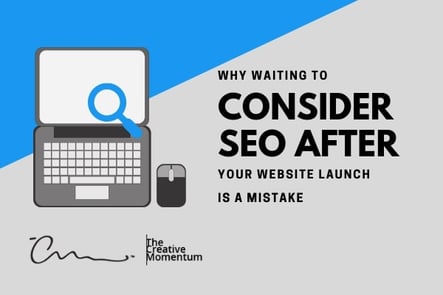
While hindsight can be 20-20, there’s no substitute for proper planning. There’s a lot that goes into designing a website, but one frequently overlooked aspect is search engine optimization (SEO). Many forget that SEO should be part of the initial process rather than a mere afterthought, and that mistake can cripple marketing efforts and render websites ineffective shortly after launch.
SEO considerations need to be part of the design process from the ground up. Secure, or not secure? Multilingual or just English? Rigid architecture or flexible? Even the content itself should be planned out ahead of time. After all, you can't meet your target market's needs if you don't design pages that address those needs to begin with.
All these considerations will impact your future SEO, and leaving them until after your website launch can be costly.
Address Technical Details in Advance
Before you launch your website, you need to work out all technical details well in advance to ensure a fast-loading website that is compatible with all popular online and mobile web browsers. The faster a website loads with all content, links, buttons and other elements working properly, the better the SEO ranking.
You also should opt for using hypertext transfer protocol secure (HTTPS) connections to protect online information from hackers and other online predators. HTTPS is the strongest protection for personal privacy available for public website connections. Google and other search engines typically provide better rankings for websites using HTTPS connections. So do savvy online and mobile consumers.
SEO, Design, and Target Market
The entire point of having a website is to market your ideas, goods, or services to the likeliest audience of consumers. That audience likely will have defining characteristics, be they geographic, technical, or other, and they should be identified and planned for from the start.
Having a thorough understanding of your buyer personas will allow you to craft content that truly resonates with your target audience. This includes using keywords or terms that they are most likely to use during search.
Your Audience's Technical Parameters
More than half of consumers use mobile devices to search the internet – particularly when considering making a purchase decision. But this is a bird's eye view of the entire web-using demographic, and not necessarily representative of your particular target market.
How does your market research? When do users look information up? Is it during work hours from a desktop? Perhaps it's from the car while driving (e.g., looking for a restaurant)? Knowing how your market searches for the kind of information you have to share should help determine what priorities you have for the design and architecture of your site.
Websites must support mobile web browsers and technology. Google even updated its famous algorithm to reward websites that are optimized for mobile searches and devices. The faster a website loads on a mobile device, the better it will rank on Google’s search results. Yet, many website developers simply ignore mobile considerations, which cripples a website before it even launches.
When you know your audience, you stand a much better chance of effectively connecting with individual audience members and communicate all the great things you have to offer. You also gain a significant advantage over your competitors.
Target Market and Content
Additionally, knowing your target market will dictate what kinds of pages should be created in the first place. At what stage in their buying cycle will prospects primarily engage your site? Do you need to develop your site so it leads customers from the discovery process on through conversion? Will your site primarily serve as an educational resource? Will it mostly be meant as a final sales point? Knowing this will determine what pages you create and, thus, how you'll structure your future inbound campaigns.
Know Your Competitors
No business succeeds without knowing what its competitors are doing. That is especially true when it comes to online marketing and website design. You likely already have an idea of search terms that would lead consumers to your website. Those search terms also identify your top competitors, which makes it easy to conduct opposition research and get an idea of what is working well for those most likely to compete with your marketing interests.
The competition will be either direct or indirect. Direct competition comes from those who offer the same goods or services in the same market area. Indirect competition comes from those who offer different solutions for the same problem. For example, Ford competes directly with Chevy and Toyota, but indirectly with motorcycle manufacturers. You need to know the full range of your competitors and their impact on your marketing to maximize your online marketing effectiveness.
Stay Flexible
SEO tools are designed to adapt to meet the continuous improvements in search engine algorithms, consumers and changing technology. You need to adapt and change your website and marketing strategies and tactics to best compete in the ever-changing online environment. It is critically important to plan for SEO considerations well in advance of launching a website or web page. It is equally important to ensure you can make necessary changes quickly and adapt to maintain a strong SEO competitive advantage over competitors and reach the most potential customers.


